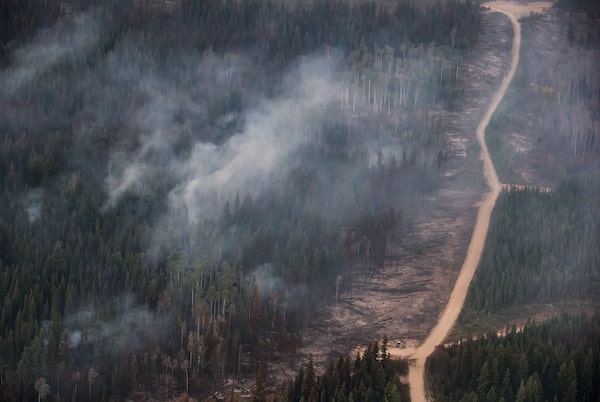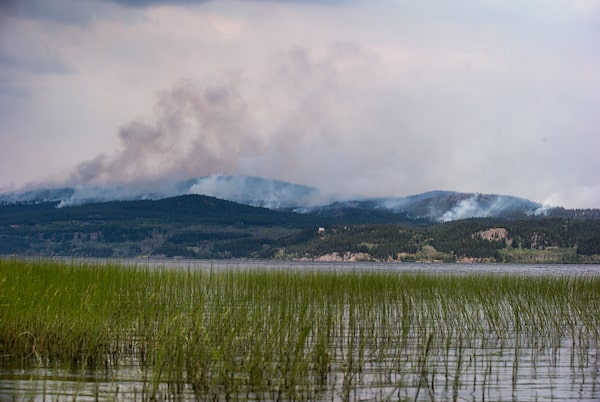
A fire break is seen in an area where a controlled burn was conducted to keep the Shovel Lake fire from reaching the Nadleh Whut'en First Nation in Fort Fraser, B.C., on Aug. 23, 2018.DARRYL DYCK/The Canadian Press
Claudia Cornwall is North Vancouver-based author, currently writing a book about her own and others' experiences living amid wildfires. She teaches at The Writer’s Studio at Simon Fraser University.
For the second year in a row, B.C. has declared a State of Emergency due to wildfires. This year, 630,000 hectares of forest have burned and 3,000 people have been displaced. The destruction is, so far, not as great as in 2017, when 1.2 million hectares went up in smoke and 65,000 people were displaced. Still, the news aroused for me vivid memories of last summer.
My husband and I were at our cabin on Sheridan Lake, about 150 kilometres north of Kamloops. The place has been in my husband’s family for 60 years. Gordon and I had our honeymoon there; so did our son and his wife.
All summer, we watched anxiously as the Elephant Hill fire raged northward. We scrutinized fire maps and watched for hot spots. The fire kept getting closer and closer. On August 30, we woke to the thickest smoke we’d ever seen – pestilential, yellow, impenetrable. The fire maps were frightening: The fire was now within four km of the southwest corner of the lake. Around noon, the Cariboo Regional District phoned: We were under evacuation order. Get out immediately.
Gordon rigged a fire hose as a sprinkler on the roof and attached it to our pump. He figured we had maybe 60 minutes of spray before the pump ran out of gas. We loaded the boat and as we pulled away from the dock, I wondered if we’d ever see our place again. At the resort on the western end of the lake where our car was parked, we said goodbye to the owner, who told us he was staying on despite the evacuation call. I hugged him and wished him luck but had an awful sinking feeling in my stomach.
The fire arrived at Sheridan on Sept. 2. But a lucky shift of wind late in the day drove it south and all the homes and cottages on our lake were saved.
The American poet Charles Bukowski wrote, “What matters most is how well you walk through the fire.” Last summer, the people of British Columbia walked very well indeed – and will do so again this year.
In the Cariboo, the impulse to help your neighbours is deeply ingrained. Kurt Van Ember, who owns the Chilcotin Lodge in Riske Creek, told me that last summer that fire threatened his place three times. The first time, he was astonished when, “Suddenly, all the neighbours came.” He was new to the area – he had just bought the lodge in April – but it didn’t matter. “There must have been 15 to 20 people who came from nowhere. Everybody had water trucks and skidders. I didn’t know who they were. It was unbelievable.” They all worked together until 11 p.m. at night when, aided by a wind shift, the residents were, for the moment, out of danger.
Last year, Williams Lake was evacuated on July 15, and 7,000 vehicles of evacuees took nine hours to pass the checkpoint at 100 Mile House. According to RCMP Superintendent Michel Legault, in charge of the operation, 10,000 people left that night. Though many individuals were under great stress, there was no road rage – only one accident. A woman fell asleep at the wheel and slid over the shoulder. The convoy went south from Williams Lake, east on Highway 24 to Little Fort. At the general store (owned by the same family since 1919), Pam Jim gave out sandwiches until 3 a.m. “We gave out as much as we could. People were so appreciative. They got evacuated at supper time and they didn’t get any food. Some of them just about cried when they got that sandwich. They’d ask, ‘Do I have to pay?’ and I said, ‘No you don’t. Take a sandwich.’” As one young rancher put it, “Phenomenal heart come out.”
I was struck by how resilient and resourceful people were. Ryan Lake, an ex-fish boat captain with an amputated leg, elected to stay at his place just north of Clinton when the evacuation order came on July 29, 2017. As luck would have it, his prosthesis stopped working. With the evacuation order on, it was difficult to move anything in or out of Clinton so he couldn’t get it fixed. But he had a pair of crutches. He could still move sprinklers and hoses, although the crutches made him awkward. “At one point in the middle of the night,” Ryan said, “I was dragging a hose. I’d tripped over something, I’m lying on my back, looking at the sky. I thought, ‘Oh fire, just take me!’ Then I thought, ‘If I lie here any longer, somebody is going to look out their window, they’ll look down and panic, they’ll think I’ve had a heart attack or something.’ So I got myself up and carried on.’”
Meanwhile, Ryan’s neighbours, Morgyn and Kim Bosche, cleared away brush and bought a generator. They were wine-makers and converted their pick-up into a small fire truck by filling unused fermentation vessels with water.
On a larger scale, a rancher and his family in Hanceville invested in their own firefighting equipment. “There’s nobody better than yourself to be a first responder, if you’re capable and able to do it. We are,” he told me. "With a cat, excavator and lowbeds, we can move equipment around. We’ve got a 5,500-gallon water tanker. I had nine or 10 fire pumps, thousands of feet of hose and nozzles and then I went and bought more. I thought we’d better be prepared.”
Despite these efforts, there were losses. Last year, the province spent $568-million on firefighting, and this year another $173-million. We see how the destruction of last year continues to create more destablilization. Burned slopes do not hold moisture very well and are at risk for mudslides. This August, a slide forced the evacuation of 24 members of the Bonaparte Band whose land had been damaged by the Elephant Hill Fire.
The emotional toll is long-lasting. I remember Ray Paulokangas, who kept wiping his eyes as he spoke about his cabin at Pressy Lake, one of 33 burned to the ground there. “Four generations enjoyed it,” said Ray when I first met him. He said his family intended to build a new place. But zoning bylaws had changed since his father’s time. Thorny issues around the siting of a new septic field and dealing with seemingly inflexible bureaucrats made reconstruction much more difficult than he expected.

The Shovel Lake wildfire burns on a mountain above Fraser Lake on Aug. 23, 2018.DARRYL DYCK/The Canadian Press
This spring, Ray decided to go back to Finland, where he was born. After living in Canada for 53 years, this meant leaving his children, his grandchildren, his brothers, his sister and their children and grandchildren. Grief about his cabin was part of the reason for his choice. I told him I thought Canada had failed him.
Kenny Dougherty lives on a ranch south of Clinton that his great-grandfather obtained in 1862. On Aug. 1, 2017, the BC Wildfire Service sent helicopters to drop incendiaries on an area south of the ranch, on the east side of Highway 97. The burn was intended to consume fuel ahead of the Elephant Hill fire and stop it in its tracks, but it didn’t go as planned. The fire jumped the road. Kenny said, “We were sure things weren’t good down there because of the thick black smoke. The flames were coming over the top of the hill and suddenly there were five helicopters going like crazy.” They were bucketing to try and contain the fire. Nevertheless, it came north. Much of the ranch’s rangeland burned. Although Kenny’s house and the fields immediately around it survived, whenever he hears a helicopter now, it brings on a torrent of emotion. “They’re lighting the fires. But they’re there saving you, too. It’s a real mixed feeling.”
Generally, people in the Cariboo don’t like to talk about their problems. They like to be left alone to deal with them. But the problems they face now are not of their own making, and they can’t solve them alone. Climate change led to the pine-beetle infestation that caused many trees to die and become tinder for the fires. Climate change also led to storms in the region becoming more ferocious. In May of last year, gusts near Sheridan Lake reached 90 km/h in some places, snapping the trunks of even hundred-year old trees and uprooting others. Afterward, at the back of our property, massive logs were scattered in the forest like a giant’s game of pick-up-sticks. Some of these trees had been “standing dead” – upright, although killed by the beetles. But many were perfectly healthy. I had never seen carnage like that before. This summer, we hired someone to move the logs, and build slash piles which we will burn next year to reduce the fuel load in our forest.
My neighbours in the Cariboo will step up to the plate, as they have always done. They will fire smart their homes. They will buy pumps, hoses and sprinklers to defend themselves. But unless we all do our part, won’t this be for naught?
Until we grapple with the fundamentals – tackle our addiction to fossil fuels that is leading to hotter and drier summers – won’t the trees continue to die? Like my friends in the Cariboo, we all need to take responsibility. As I write this, a thick pall of smoke lies over British Columbia. There was a wildfire in West Vancouver, of all places. We need to act now.